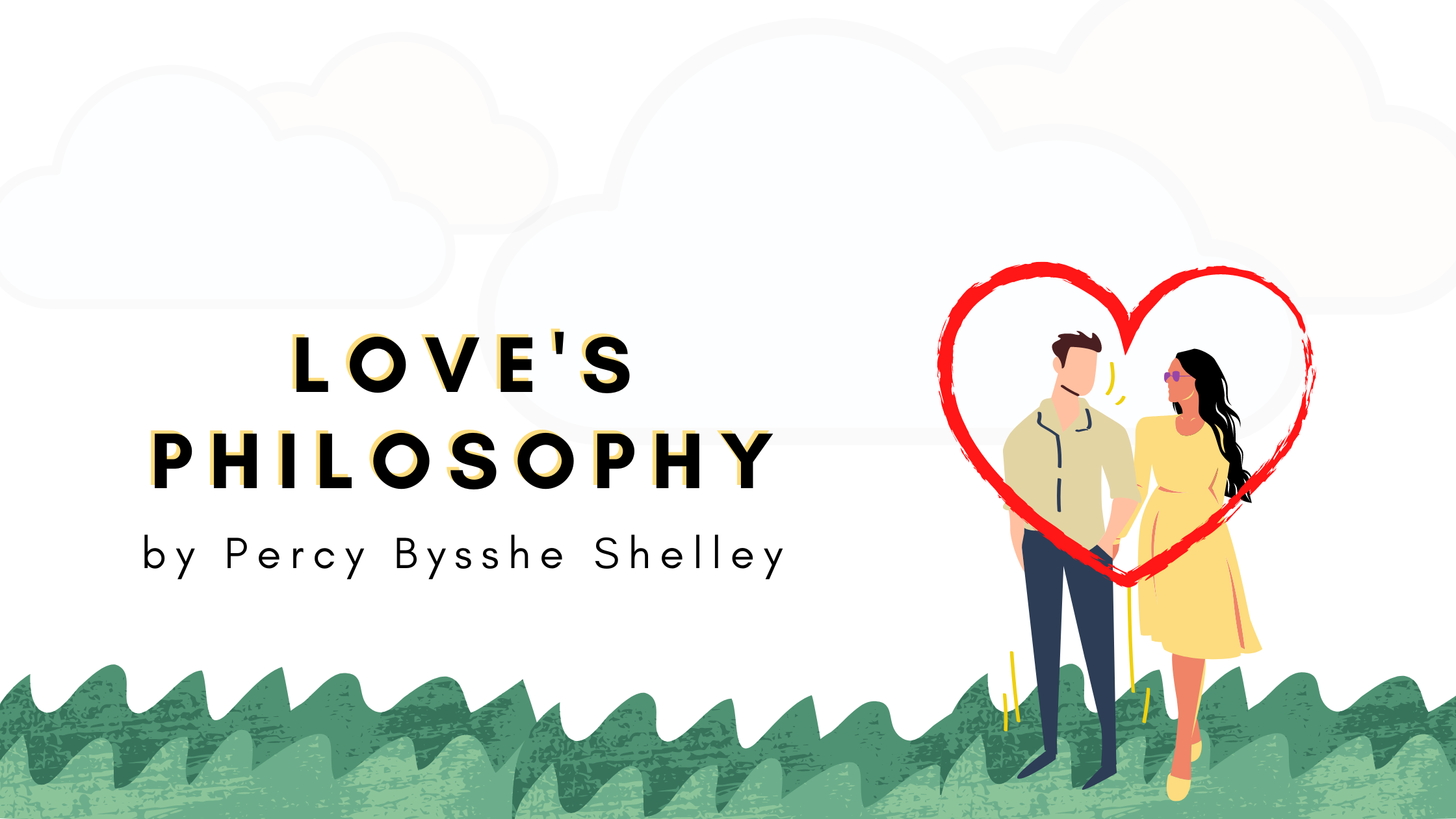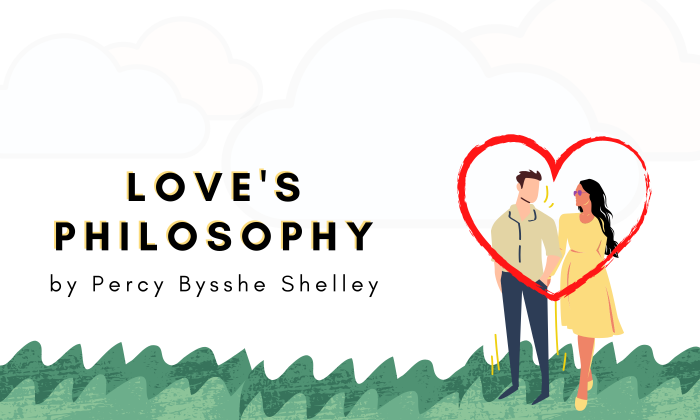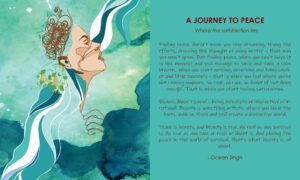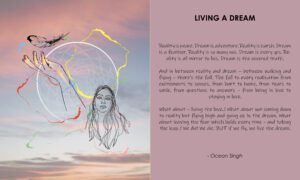Love’s Philosophy – The Poem
The fountains mingle with the river,
And the rivers with the ocean;
The winds of heaven mix forever
With a sweet emotion;
Nothing in the world is single;
All things by a law divine
In another’s being mingle-
Why not I with thine?
See, the mountains kiss high heaven,
And the waves clasp one another;
No sister flower could be forgiven
If it disdained its brother;
And the sunlight clasps the earth,
And the moonbeams kiss the sea; –
What are all these kissings worth,
If thou kiss not me?
~ by Percy Bysshe Shelley
Love’s Philosophy – Explained
What is Philosophy?
The Oxford definition of the term philosophy says, “the study of the fundamental nature of knowledge, reality, and existence, especially when considered as an academic discipline.”
Wikipedia defines philosophy as “the study of general and fundamental questions about existence, knowledge, values, reason, mind, and language”. It says, “Such questions are often posed as problems to be studied or resolved. The term was probably coined by Pythagoras”.
What is Love?
The word “love” is derived from a Germanic form of the Sanskrit word “lubh” which means desire. So, is love desire? Doesn’t this shake the very roots on which our faith in “love” is based? Or is it that we have given wrong words to or beliefs?
What is Love’s Philosophy?
It is a field of social philosophy and ethics that attempts to explain the nature of love.
Not having much knowledge about the field of philosophy, all we can do is Google about it. And the first page of Google’s search results is filled with classical texts from ancient Greek Philosophy. It mainly talks about three terms: eros, philia, and agape.
The oldest one is ‘Eros’. It talks about human’s desire for beauty. This philosophy is based on the idea, “he who loves the beautiful is called a lover because he partakes of it.” It is believed that each individual has a different idea, view and perceivance. The Platonic-Socratic assertions maintain that these desires cannot be satisfied during a man’s lifetime.
The second theory of Philia talks about love as true friendship. It mainly talks about love being about the faithfulness. The highest condition of this kind of love is that man loves himself first.
And the last one, i.e. the philosophy of Agape originated to overcome the shortcomings of the previous two philosophies of Eros and Philia. It describes more of the devotional side of love. It mainly talks about the paternal love for God. It is based in the philosophy of “love thy neighbor as you love thyself.”
So, are there other love philosophies?
I am sure there are plenty. Like the first chapter of Bhagwad Gita talks about five forms of love: the love towards your father (like Krishna’s love for his father), the love towards your brother (like between Krishna and Balram), the love towards your friend (like between Krishna and Arjuna), the love towards your partner (like between Krishna and Radha), and the love towards your son (like between Yashoda and Krishna).
Like this, I am sure there are many more philosophies in the world too.
So, which amongst the three Greek Philosophy’s is your favorite?
Having only a piece of very brief information about the three philosophies only, and being an old-school, I think I am more inclined towards the Eros. Isn’t love always about beauty? Isn’t it, that you can’t seem to find any flaw in your love interest?
Has it ever happened to you? Your sibling ever made fun of the way your best friend walks or the way they talk? And you ended up in a fight with your siblings because you don’t seem to observe anything wrong in them? For me, the persons you love are always the most beautiful people in the world. And like Eros’s belief the perception of beauty is different amongst each individual. So, at the end it all comes down to beauty.
Percy Bysshe Shelley

Percy Bysshe Shelley (4 August 1792 – 8 July 1822) was one of the major English Romantic poets, widely regarded as one of the greatest lyric and philosophical poets in the English language. A radical in his poetry as well as in his political and social views, Shelley did not see fame during his lifetime, but recognition of his achievements in poetry grew steadily following his death. Shelley became a key member of a close circle of visionary poets and writers that included Lord Byron, John Keats, Leigh Hunt, Thomas Love Peacock, and his own second wife, Mary Shelley (the author of Frankenstein).
Shelley is best known for classic poems such as “Ozymandias”, “Ode to the West Wind”, “To a Skylark”, “Music, When Soft Voices Die”, “The Cloud” and The Masque of Anarchy. His other major works include a groundbreaking verse drama, The Cenci (1819), and long, visionary, philosophical poems such as Queen Mab (later reworked as The Daemon of the World), Alastor, The Revolt of Islam, Adonais, Prometheus Unbound (1820)—widely considered his masterpiece, Hellas: A Lyrical Drama (1821) and his final, unfinished work, The Triumph of Life (1822).
Shelley’s close circle of friends included some of the most important progressive/radical thinkers of his day, including his father-in-law, the philosopher William Godwin (1756–1836), and Leigh Hunt (1784–1859). Though Shelley’s poetry and prose output remained steady throughout his life, most publishers and journals declined to publish his work for fear of being arrested for either blasphemy or sedition. Shelley’s poetry sometimes had only an underground readership during his day, but his poetic achievements have become widely recognized today, and his political and social thought had an impact on the Chartist and other movements in England, and reach down to the present day. Shelley’s theories of economics and morality, for example, had a profound influence on Karl Marx (1818–1883); his early—perhaps first—writings on nonviolent resistance influenced Leo Tolstoy (1828–1910), whose writings on the subject, in turn, influenced Mahatma Gandhi, and through him Martin Luther King Jr. and others practicing nonviolence during the American civil rights movement.
Shelley became a lodestar to the subsequent three or four generations of poets, including important Victorian and Pre-Raphaelite poets such as Robert Browning (1812–1889) and Dante Gabriel Rossetti (1828–1882). Admirers have included Oscar Wilde, Thomas Hardy, George Bernard Shaw, Leo Tolstoy, Bertrand Russell, W. B. Yeats, Upton Sinclair and Isadora Duncan. Henry David Thoreau’s Civil Disobedience (1849) apparently shows the influence of Shelley’s writings and theories on nonviolence in protest and political action. Shelley’s popularity and influence has continued to grow in contemporary poetry circles.
To read more about Percy Bysshe Shelley, click here.
Love’s Philosophy – Poem Analysis
Love’s Philosophy is a poem where the speaker of the poem is trying to woo the addressee. S/he calls for their union stating that it is the divine law of nature.
Percy Bysshe Shelley begins by stating the very concept of love, be it between various elements of nature or otherwise. According to her, the most important aspect of love is unionship. And this fact is evident in the way mountains meet rivers, and rivers meet oceans, and other examples stated in the poem.
And then she questions, if that is the only way, then why not take her relationship with her lover forward by the way of a union.
Love’s Philosophy – Rhyme Scheme
Shelley’s “Love’s Philosophy” follows a regular form. It consists of two stanzas, each of which is an eight-line octave.
“Love’s Philosophy” has a highly regular rhyme scheme. Each stanza runs ABABCDCD.
Most lines are written in lines of four-syllable tetrameter, with a few notable exceptions, and the governing metrical foot of the poem follows the stressed-unstressed pattern of the trochee.
To read more famous poems by the finest writers ever, click here.









I’ve been liking this poem for a long time, but I’ve never pondered on love’s philosophy concerning it. You made a surprising work by your essay. It motivated me to inquire about the time of origin of these philosophies. If you don’t mind, I write some of them here.
Unfortunately, on the net I didn’t it find, but me appears a source that earlier suggested that Platonic philosophy took some ideas of Buddhism and Platon itself made his philosophy impressed by them. I suspected it by more signs and that source confirmed my idea that I think it well. But, ‘Eros’, ‘Philia’ and ‘Agape’ maybe, must have their root in an earlier epoch than Ancient Greek philosophers. Since the root meaning of these words belongs to the basic language vocabulary of any language, they must have had their origin in the period of the very beginning of the language. So, if we consider these all, probably there are parallels, but not interference between the philisophies in this relation that built up round these words. I think so, at least.
The 5 forms of Bhagawad Gita I can compare to Ancient Greek without an interference though the latter is younger.
And yet one more thought: Platon interpreted ‘Eros’ as a helper for the soul to get the knowledge of ‘beauty’ and towards it, ‘Eros’ helps the soul to understand the spiritual truth. That happens through physical phenomena the abstract idea. For this aim serves art: it can show up that physical beauty that point to it.
And since humans always can grab first of all physical phenomena, if we consider a romantic love between a man and a woman, this love can lead them to these higher spheres. (As for me.) To this thought I can attach yet the devotional love of God through physical like the bhaktis do and like the Ancient Christians did on the feasts of love or charity. And I enjoyed very much your thoughts on this topic.
On the poem itself: Shelly masterly shows up the divine law, love that are all phenomena of Nature are subordinated to. And he mingles these images with a playful rhythm and rhymes that are metrically szstained, as well. Sorry, if my thoughts were boring or too long. Thank you both the poem and the essay. They’re really artworks. 👌😊